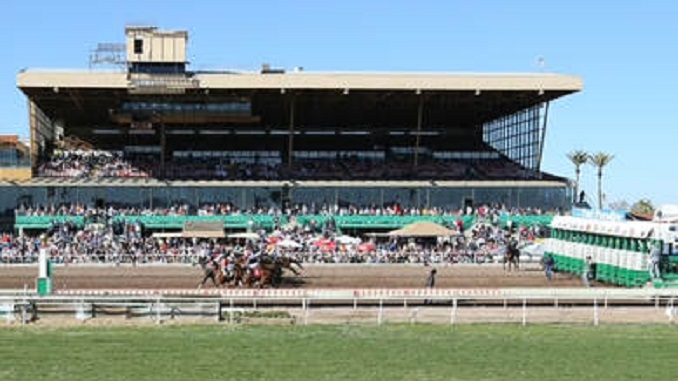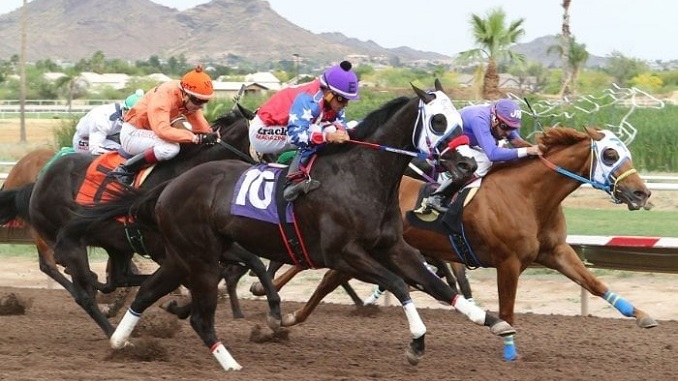
Hobbs Ensures Closure Of Historic Racetrack, Costing Thousands In Jobs And Millions In Revenue
By Corinne Murdock |
The historic Turf Paradise racetrack in Phoenix responsible for generating thousands of jobs and hundreds of millions in revenue will close, with Gov. Katie Hobbs partly to blame. Those involved in the racetrack and in a failed deal to purchase it have offered accounts of Hobbs that indicate the governor neglects issues that won’t benefit her politically, even if they benefit the state.
As part of this apparent neglect, Hobbs removed a budget item over the summer that would have continued a $5 million COVID-19 relief grant to Turf Paradise, slashing it to $1 million. Hobbs has also reportedly refused to assist in legislative deals viewed as necessary to secure the purchase of the racetrack.
James Watson — managing partner of the California-based company that failed to close their deal on the racetrack, CT Realty — said Hobbs cut the funds because she “doesn’t care” about racing.
“We’ve been arguing, as is evident across the country, that racing is struggling right now. It needs all the help it can get,” said Watson in an interview with DRF. “But the governor doesn’t care about racing.”
The racetrack would bring in about $90 million into the local economy during its race meet session from November through May, according to the track’s general manager, Vincent Francia, in an interview with ABC 15.
The economic impact from Turf Paradise’s closure is expected to cripple the state’s horse industry. On top of the closure of the track’s 37 betting sites, the track’s leading trainer Justin Evans told BloodHorse that the farms, ranches, feed stores, horseshoers, apartment complexes, trailer parks, and all other businesses “down the line” that rely on the racetrack season for revenue will be crushed by the closure. Evans reported that he moved his family to Louisiana due to the closure.
“It’s gonna kill [the Thoroughbred industry, the racing industry in Arizona] because now people are going to other places and they’re going to make a new life and they’re not going to come back on a whim that it’s going to reopen or now everybody’s going to be gun shy like they are with Arizona Downs,” said Evans. “This is a terrible thing for the racing community, for the fans, for jocks, trainers, owners, and grooms.”
CT Realty’s deal fell through recently despite its projection to close in December. In addition to the funding, a critical contingency for their deal was the legalization of casino-type games, namely the historical horse racing machines. CT Realty reportedly earned lawmakers’ support on the legalization. However, tribal community lobbyists successfully stonewalled their efforts, arguing that the proposed gaming would jeopardize their gambling industry.
Per reporting by DRF, track owner Jerry Simms was also thwarted by tribal lobbyists in his attempts to obtain similar gaming legalizations over the years.
It’s likely an intervention by the governor would’ve saved the racetrack. Watson indicated to Axios last month that Hobbs had multiple opportunities to legalize the horse racing machines. This would’ve included working with the legislature to overcome tribal opposition earlier this year, or even calling a special session this fall to address the issue.
Such an exercise of power wouldn’t be unusual for Hobbs. Just several months ago, Hobbs stripped all 15 county attorneys of their authority to prosecute abortion cases. That authority went to her political ally, Attorney General Kris Mayes.
A partner in the failed track purchase, Larry Lucas with Revolutionary Racing, told Paulick Report that Gov. Katie Hobbs “lack of interest” in fighting for Turf Paradise’s survival had “frustrated” him.
Simms announced that the site will close on Oct. 1 and that he would retire. Simms purchased the track over 20 years ago for $53 million.
CT Realty planned to develop the site to maintain some horse racing, with other parts of the property turned into housing, industrial lots, and a data center.
Some locals also blamed Sims for difficulties that led to the track’s closure, a speculation that aligns with reporting issued over the years on open feuds with track officials and the large racing company 1/ST Racing.
Others opined the closure was the inevitable outcome of a dying industry.
Turf Paradise opened over 67 years ago, on Jan. 7, 1956, under a Phoenix millwork company owner named Walter Cluer. The businessman purchased 1,400 acres of the desert to establish the racetrack.
Corinne Murdock is a reporter for AZ Free News. Follow her latest on Twitter, or email tips to corinne@azfreenews.com.

